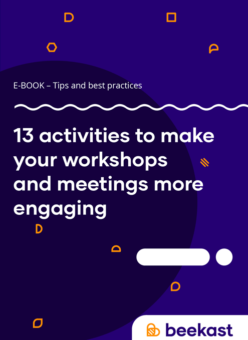Looking to organise an effective work meeting? Follow these 6 commandments to ensure that your next meeting is both enjoyable and effective.
Leading an effective work meeting
1. Thou shalt prepare an agenda
Starting a meeting without an agenda prepared and announced to all participants in advance is a common mistake that will leave many of your employees frustrated.
So how should you prepare for your meeting? Start by specifying the context, setting objectives and establishing a plan for the meeting. At a minimum, the agenda must explicitly indicate the type of meeting, the objective, and the topics that will be discussed.
2. Thou shalt invite the right people
Who will take part in the meeting? Organisers need to ask themselves this question well in advance. Every person at the table should have a well-defined role and provide added value on the meeting topic.
How should the participants be invited? The recommended approach is to send out the agenda at the same time as the invitation. It all depends on the type of meeting, but nowadays, email invitations are generally sufficient. Note that participants appreciate being invited a few days before the day of the meeting.
3. Thou shalt bring the necessary materials
To achieve the meeting’s objectives and help it to run more smoothly, certain materials will surely be useful: a flip chart, visuals, graphics, sticky notes, a white board, or any other necessary documents. All of these can help to encourage interaction and keep the discussion moving. But skip the traditional top-down PowerPoint presentation! Collaborative materials are more effective at keeping participants engaged. Beekast is a tool that helps make work meetings much more interactive.
4. Thou shalt let participants take the lead
An organiser’s role is generally to guide and facilitate the work meeting. It’s their responsibility to keep discussions between participants moving forward, while making sure that everyone gets a chance to speak, contribute to the discussion and create value.
As the name implies, team meetings are focused on the group. The organiser’s role is to guide the group towards the objective it is trying to achieve. Their sole priority is to generate collective intelligence.
The organiser should also designate a timekeeper to help stick to the announced schedule, and to avoid wasting time and frustrating participants.
That way, all the organiser has to do is to structure the meeting’s progress based on the agenda to ensure that the meeting is productive for everyone involved.
5. Thou shalt take meeting notes
What’s the point of having a meeting if there’s no follow-up afterwards? Prepare meeting notes to document the decisions that were taken, summarise the discussion and highlight the action plan going forward. Don’t wait until the meeting is over to put someone in charge of the meeting notes — do it ahead of time, even before the meeting starts.
Better yet, with Beekast there’s no need for a note-taker: the meeting notes are generated automatically with all the data from the meeting. Efficient, right?
Read our tips on how to prepare meeting notes
6. Thou shalt use the right collaborative tools
There are lots of collaborative tools on the market to help run meetings. Their role? To facilitate communication and encourage discussion, organise production and manage projects, store data and share files, but also to organise remote meetings.
From Microsoft Teams to specialised videoconferencing tools, along with task management tools like Jira, Monday or Trello, every organisation can find tools that adapt to their needs and their environment.
Beekast: a tool for hosting your work meetings
From preparing the work meeting to hosting it, and from there to taking decisions and following up on actions, Beekast makes your work meetings more dynamic with interactive activities that adapt to any work environment. As a meeting organisation tool, it’s always accessible and easy to use — no matter who’s organising the meeting or who the participants are. Beekast offers a smooth, highly effective experience, whether you’re an expert with digital tools or not!

